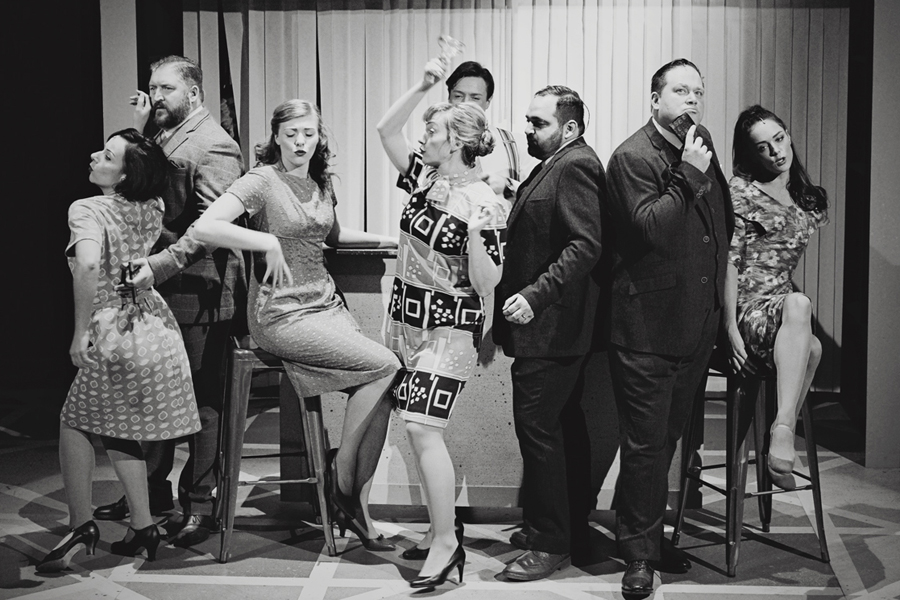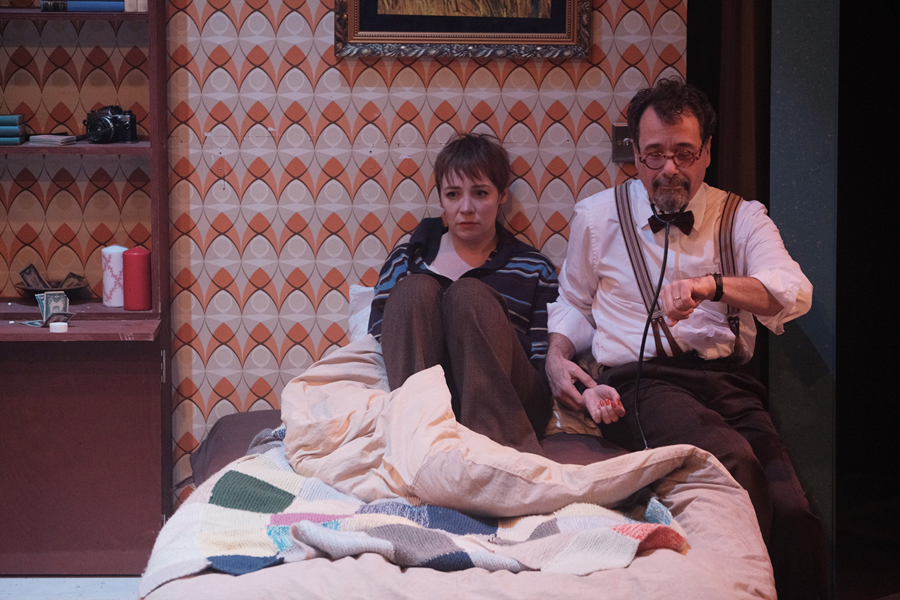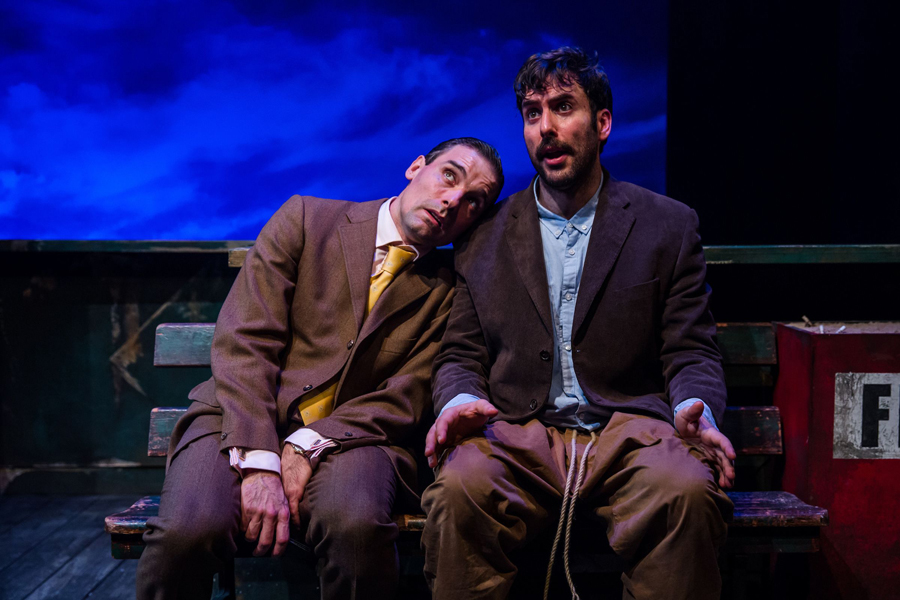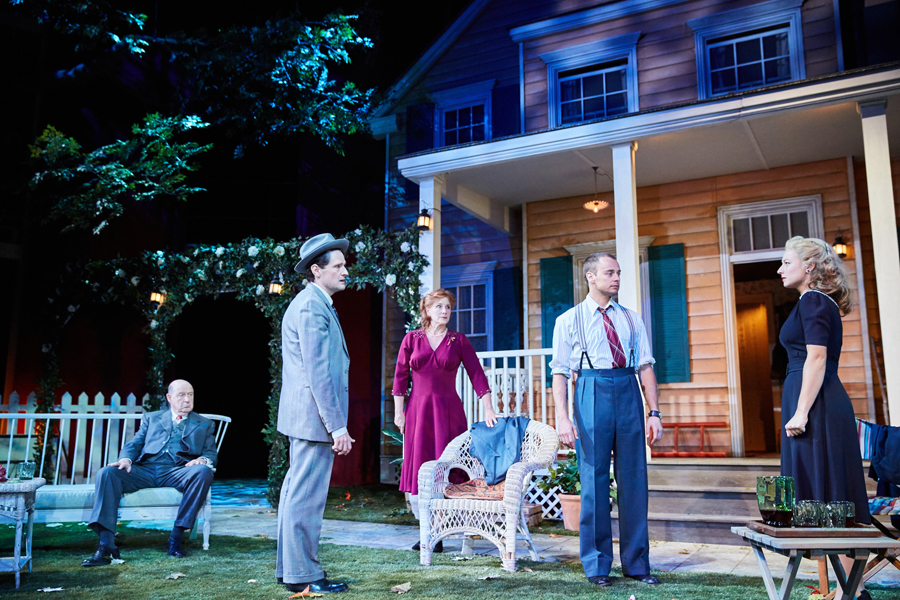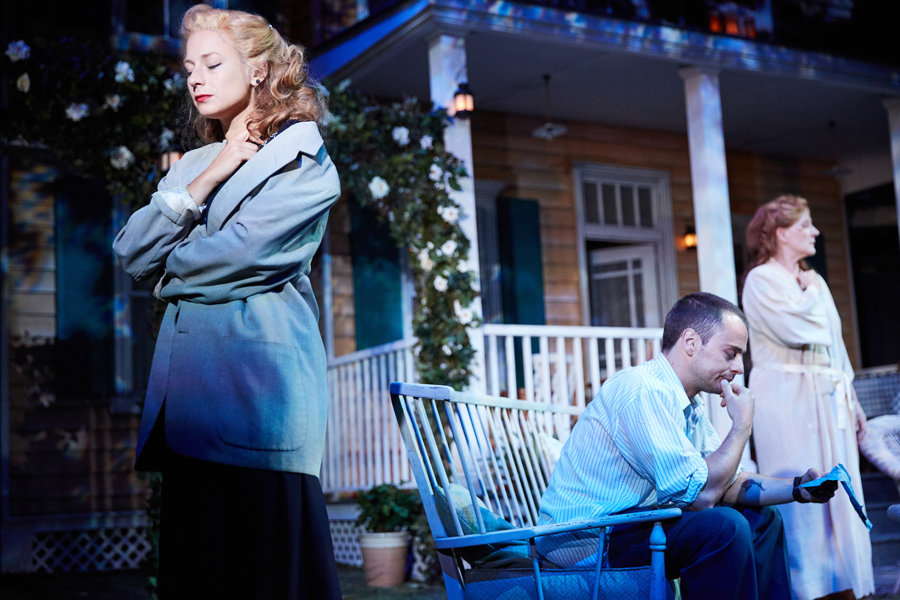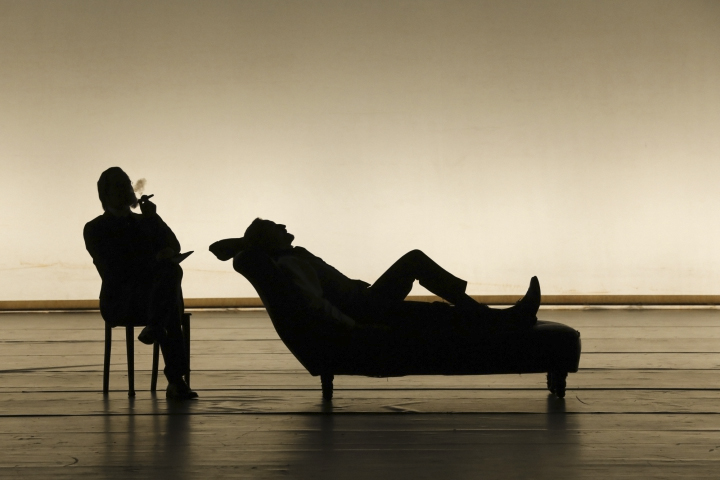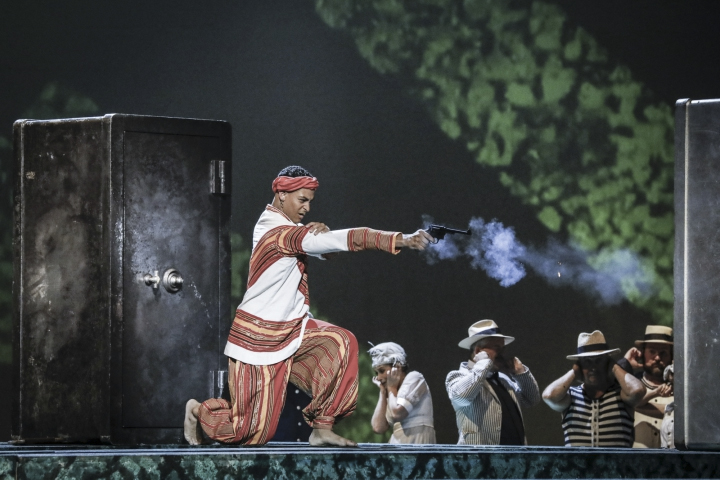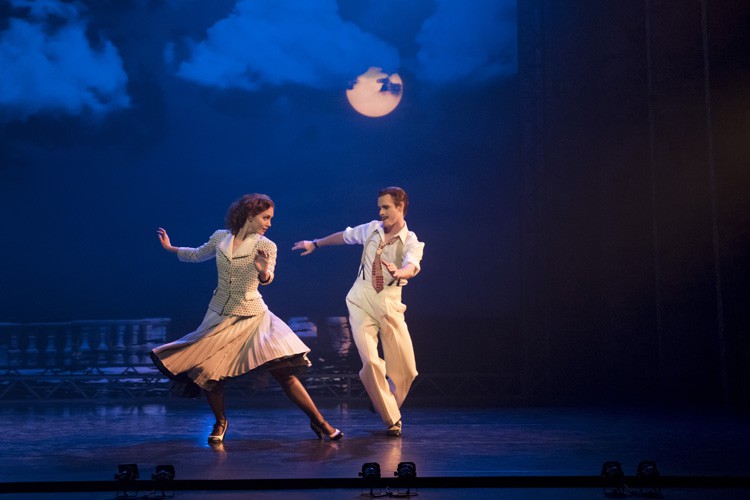 To Powell and Pressburger go the plaudits for moulding Hans Andersen's fairy tale with its hard magic into an allegory of art versus life. To Bernard Herrman the plaudits for writing film music that brilliantly conjures mood and emotion, atmosphere and character. And to Matthew Bourne with his creative team, led by designer Lez Brotherston and composer/orchestrator Terry Davies and with his close-knit family of dancers, goes the glory for taking all this magic and distilling it into two hours of transcendent storytelling that ravishes the senses.
To Powell and Pressburger go the plaudits for moulding Hans Andersen's fairy tale with its hard magic into an allegory of art versus life. To Bernard Herrman the plaudits for writing film music that brilliantly conjures mood and emotion, atmosphere and character. And to Matthew Bourne with his creative team, led by designer Lez Brotherston and composer/orchestrator Terry Davies and with his close-knit family of dancers, goes the glory for taking all this magic and distilling it into two hours of transcendent storytelling that ravishes the senses.
Filmmakers Michael Powell and Hungarian-Jewish refugee Emeric Pressburger met in 1939, at the London studios of Jewish movie mogul Alexander Korda. They formed a partnership that would produce lushly visual films with wonderfully-crafted stories, The Red Shoes, the magic realist A Matter of Life and Death, starring a dashing David Niven, the religious drama Black Narcissus, a vehicle for Deborah Kerr; and the time-travelling heroics of The Life and Death of Colonel Blimp (also starring Kerr, alongside Roger Livesey).
Bernard Herrmann was a giant among film composers, the go-to music man for Alfred Hitchcock, for whom he wrote scores including North by North West, Vertigo and Psycho. For Orson Wells he composed the music for Citizen Kane and for Truffaut for the dystopic sci-fi movie Fahrenheit 451. Now Herrmann is the go-to man for Bourne and Davies, who use music from Fahrenheit 451 and Citizen Kane and Herrmann's Oscar-winning The Ghost and Mrs Muir, as well as lesser-known, equally vivid Herrmann compositions. Davies' genius is in scoring the music for a small orchestra dominated by strings and keyboards, complemented by percussion, a glorious plangent sound that enhances mood and emotion, a gorgeous take on this period music that takes you into the world of men and women who live for their art.
A love triangle stands for the struggle between art and life. Aspiring ballerina Victoria Page succeeds in attracting the attention of ballet impresario supreme Boris Lermontov and becomes his protégée and his star – and the object of his affections. But she falls in love with his other protégé, gifted young composer Julian Craster – hence the pianos onstage as well as in the orchestra. Lermontov creates The Red Shoes ballet for Page, but its dark story of the shoes that force their wearer to dance to their tune proves dangerously prophetic as Craster and Lermontov face each other and Page struggles to balance her life in art with her desire for a real life.
The precarious balance between art and life is brilliantly realised by Brotherston's set – a grand pair of lush red velvet curtains, a proscenium arch framing the dancers in Lermontov's ballets, instantly conjuring period and cunningly conceived to swivel 90 degrees to reveal life backstage (complete with an audience mirroring us in our auditorium). Bourne and Brotherston brilliantly evoke mid 20th century dance companies, the tulle-clad prima ballerinas with their exotic 'Russian' names, the strutting male stars in tiny tunics atop tight white tights. Michele Meazza's Irina Boronskaja is a terrific star turn supported (literally) by Liam Mower channelling the likes of Michael Somes, Margot Fonteyn's partner before Nureyev leapt into her life. It's a clever, affectionate pastiche.
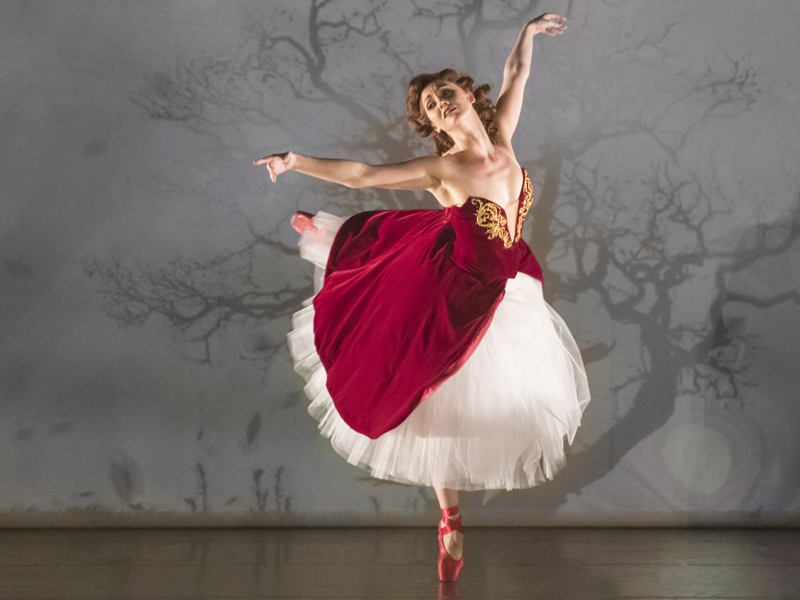
Into this effete world pirouettes Ashley Shaw's Victoria Page, a youthful whirlwind of ambition and talent. No wonder Dominic North's ardent Craster and Sam Archer's lordly Lermontov, so used to getting his own way, clash over her and what she comes to represent. This is such total theatre, that you almost think you have heard every word that passes between them, so vivid is the storytelling, so clear the allegory.
Bourne's recreation of the Red Shoes ballet is scarily exciting, graphically sucking in its heroine - and Page dancing the role. Brotherston's set is monochrome, a stunning homage to the avant garde of the period. The unsettling music from Fahrenheit 451 enhances the mood. We first see the red shoes framed by those proscenium curtains as the evening begins, lit so that Shaw wearing them is obscured. Now they seem to take on a terrifying life of their own, so that a tragic outcome to Page's story to mirror the ballet seems inevitable.
But meanwhile there are delicious delights to be had. Page's triumphant progress in the Ballet Lermontov takes her to continental France and the fun of dancers in bathing costumes playing beach ball. Her turn in a run-down East End music hall is preceded by a perfect - and perfectly hilarious - recreation of the Egyptian sand dance, complete with the eccentrics who created it, Wilson and Kepple (though not Betty, the girl who used to dance between them). And for us aficionados of music hall, the orchestra jauntily plays music hall standard Wot Cher!
Every member of the company clearly relishes creating multiple roles. And Brotherston's genius of course also extends to fabulous costumes that perfectly enhance the dance and play their part in the drama - the whole lit with a deep feel for every dramatic mood and moment by long-term collaborator Paule Constable. No wonder Bourne records his love and thanks to "the entire New Adventures family" in the programme. Their closeness and shared creativity achieve a total triumph.
By Judi Herman
Photos by Johan Persson
The Red Shoes runs until Sunday 29 January. 7.30pm (Tue-Sat), 7pm (15 & 26 Dec only), 2.30pm (Sat), 2pm & 7pm (Sun, except 25 Dec & 1 Jan). Sold Out (phone for returns). Sadler’s Wells, Rosebery Av, EC1R 4TN. 020 7863 8000. www.sadlerswells.com
Then touring: New Victoria Theatre, Woking, 31 Jan-4 Feb; Birmingham Hippodrome 7 - 11 Feb; Milton Keynes Theatre, 14-18 Feb; Theatre Royal, Norwich, 21-25 Feb; Theatre Royal Nottingham, 7-11 Mar; Wales Millennium Centre, Cardiff, 14-18 Mar; The Mayflower, Southampton, 21-25 Mar; The Alhambra, Bradford, 28 Mar-1 Apr; Bristol Hippodrome, 4-9 Apr; New Wimbledon Theatre, 11-15 Apr; The Marlowe Theatre, Canterbury, 25-29 Apr; Theatre Royal Newcastle, 2-6 May; Festival Theatre, Edinburgh, 9-14 May; Curve Leicester, 16-20 May; Wycombe Swan, 13-17 Jun.
For further details and to book visit http://new-adventures.net/the-red-shoes/tour-dates
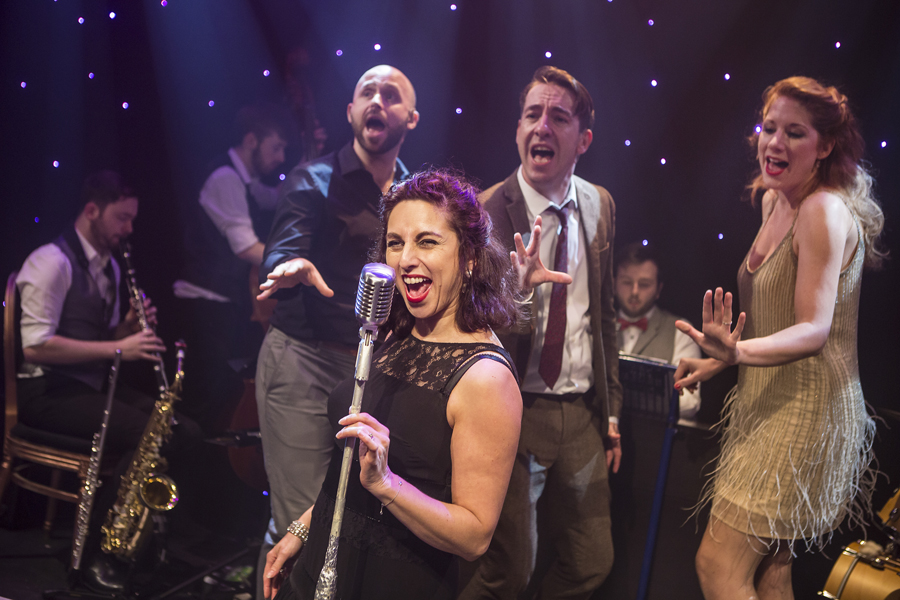 There was a terrific compilation movie that took the title of much-loved song That’s Entertainment (written by Jewish duo Arthur Schwartz and Howard Dietz for the MGM film The Band Wagon) to celebrate the Metro-Goldwyn-Mayer studio’s prodigious output; celebrating songs by Jewish composers and lyricists written for films produced by a studio founded and run by the eponymous Jewish entertainment moguls. Producer Katy Lipson proves her love and knowledge of "the magic of the musical" by touring her show The MGM Story this February. So in a way That’s Jewish Entertainment is a given, but there’s still so much to discover and enjoy as four talented performers and a four-strong band give their all to entertaining Yiddish style and tracing the trajectory of Jewish entertainment from shtetl to showbiz.
There was a terrific compilation movie that took the title of much-loved song That’s Entertainment (written by Jewish duo Arthur Schwartz and Howard Dietz for the MGM film The Band Wagon) to celebrate the Metro-Goldwyn-Mayer studio’s prodigious output; celebrating songs by Jewish composers and lyricists written for films produced by a studio founded and run by the eponymous Jewish entertainment moguls. Producer Katy Lipson proves her love and knowledge of "the magic of the musical" by touring her show The MGM Story this February. So in a way That’s Jewish Entertainment is a given, but there’s still so much to discover and enjoy as four talented performers and a four-strong band give their all to entertaining Yiddish style and tracing the trajectory of Jewish entertainment from shtetl to showbiz.




